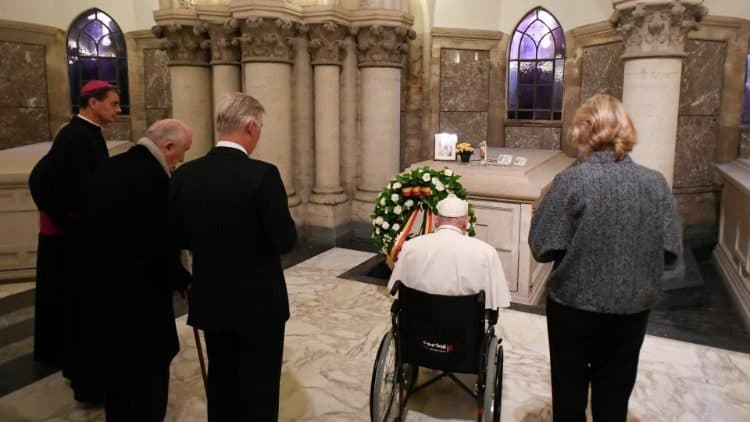ROME – Belgium’s Prime Minister has announced that he will summon the Vatican’s ambassador to protest remarks on abortion by Pope Francis at the close of a visit to the country last Sunday, which he claims constitute “unacceptable” interference in his country’s domestic affairs.
“It is absolutely unacceptable for a foreign head of state to make such statements about democratic decision-making in our country,” Prime Minister Alexander De Croo said Thursday during a session in Belgium’s Chamber of Deputies.
“We do not need lessons on how our parliamentarians democratically approve laws,” De Croo said. “Fortunately, the time when the Church dictated laws in our country is long gone.”
De Croo had used his own meeting with Francis last Friday to publicly scold the pontiff for the Church’s handling of clerical sexual abuse scandals, which have hit Belgium particularly hard.
His decision to summon Archbishop Franco Coppola, the papal nuncio, or ambassador, to Belgium and Luxembourg over the abortion comments, came after the rector of the Free University of Brussels, Jan Danckaert, published an opinion piece in the leading Dutch-language daily asserting that the pope’s language “not only insults the doctors who perform abortions, but also Belgium and its population.”
“It is actually unheard of that a foreign head of state — because that is what Pope Francis is — assumes the right to attack a law of another and moreover democratic country,” Danckaert wrote in piece for De Standaard.
During his customary in-flight news conference on the way back to Rome after a Sept. 26-29 trip to Belgium, Pope Francis took a question from a Belgian journalist about his tribute to the late King Baudouin, who resigned for a day in 1990 rather than sign a law legalizing abortion.
As part of his response, Francis employed language on abortion he’s used several times in the past, though not in the context of a visit to a specific country.
“Let’s not forget to say this: Abortion is murder,” the pope said. “Science says that just one month from conception, all the organs are present. “A human being dies, a human being is killed. The doctors who take part in this are – allow me to use the word – they’re hitmen. They are hitmen. On this point, there’s no discussion. A human life is being killed.”
The dust-up comes at delicate time for the Belgian government. A measure currently before parliament would expand abortion access from the first 12 to the first 18 weeks of pregnancy, but it’s currently on hold pending the outcome of negotiations to form a new coalition government after June elections failed to produce a clear result.
Belgian Interior Minister Annelies Verlinden also expressed outrage earlier this week, calling the pope’s comments “unnecessarily hurtful to women and care providers.”
During the Belgium trip, Francis praised King Baudouin for his refusal to sign what the pontiff called a “murderous” law legalizing abortion, and also expressed hope that a cause for the late king’s beatification will advance.
In addition, the pope also used a bit of homespun argot during his in-flight news conference in reference to the king, saying his willingness to resign rather than sign the abortion law required “a politician with pants” – a way of saying he was courageous, but one which came off as slightly awkward in the context of a trip in which the pope’s rhetoric on women also stirred controversy.
De Croo on Thursday also groused about the pope’s visit to King Baudouin’s tomb on Sept. 28, saying the agreement was that it should be a “purely private” stop that would be announced only after the fact. In reality, De Croo complained, it was “less private than announced.”
This not the first time that Belgium has objected to a pope’s comments on a sensitive ethical issue. When the late Pope Benedict XVI visited Cameroon in 2009, he told reporters that condoms are not only not the solution to HIV/AIDS, in some cases they actually make the problem worse.
In response, the Belgian parliament voted 95-18 to urge the country’s government “to condemn the unacceptable stance taken by the pope on the occasion of his trip to Africa, and to lodge an official protest with the Holy See.”
It was believed to be the first time a European parliament had formally censured a pope.













